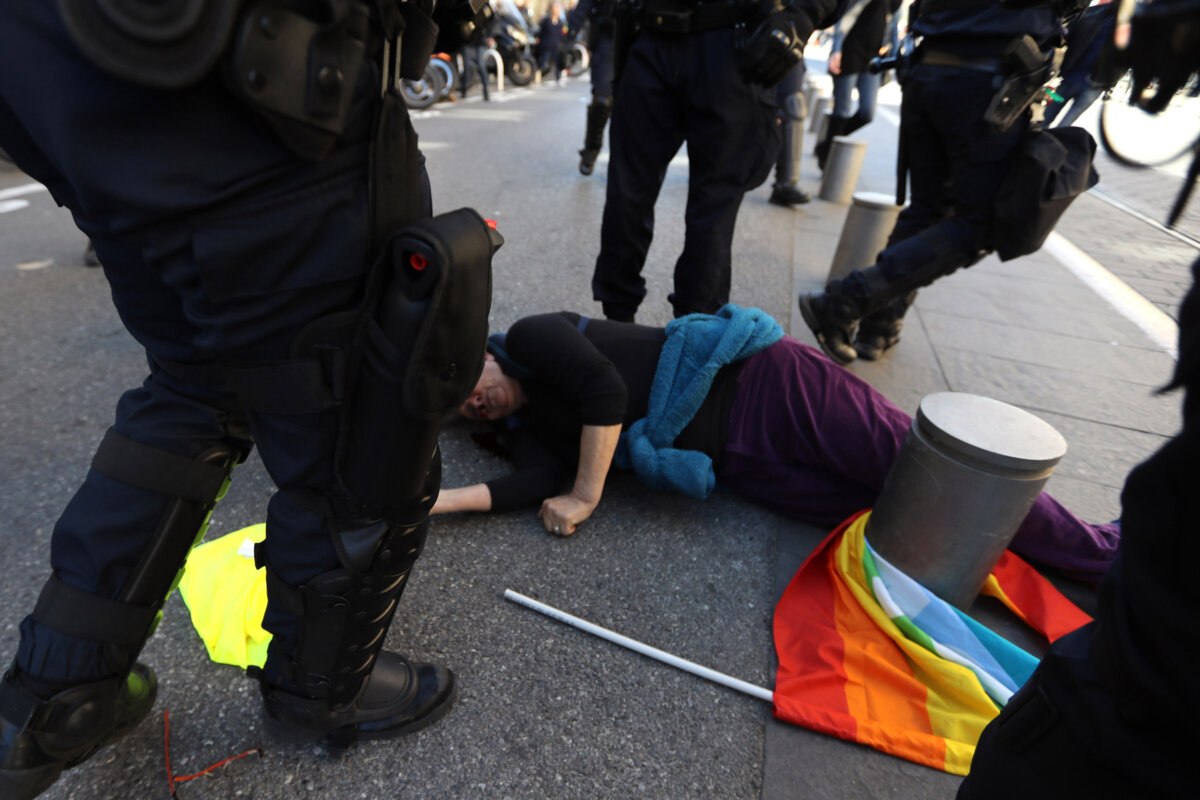Mediapart journalist Pascale Pascariello has been questioned as a potential suspect by officers from France's police watchdog who are investigating the policing of a March 2019 demonstration in which a 73-year-old woman was badly injured. Pascale Pascariello, who was questioned by a chief commissioner and a captain from the Inspection Générale de la Police Nationale (IGPN), has written a series of articles exposing the lies both of a state prosecutor and the president of the Republic Emmanuel Macron over the incident.
The aim of the IGPN investigation, which is being overseen by the prosecution authorities in Nice in the south of France where the protest occurred, is made clear by the alleged crime cited in the official judicial summons that was sent Mediapart on May 19th : “the receipt of information arising from a breach of professional confidentiality”. In other words, it is a search to find out who inside the state administration gave information to the press that embarrassed the legal system and the government.

Enlargement : Illustration 1

It is yet another worrying sign of how, under Emmanuel Macron's presidency, the authorities have repeatedly sought to target journalists' sources.
The numerous investigations carried out by Pascale Pascariello exposed the falsehoods of a magistrate – the Nice state prosecutor Jean-Michel Prêtre – and of President Macron himself in a case which has come to symbolise the recurring themes of police violence, the institutional denials of this violence and the political lies that sometimes go along with them.
It is known as the Legay affair after Geneviève Legay, aged 73, who is a member of the global justice movement Attac and who was seriously hurt during the demonstration in Nice at the end of March 2019. First the prosecutor, at a press conference, and then the French president, speaking several days later to the local newspaper Nice Matin, cleared the police of any wrongdoing. They said the police were not involved in the injuries suffered by the protester.
But the stories by Mediapart, backed up with evidence, showed that this was not true and that a police report written on the very day of the events had in fact established the opposite. Other stories by Pascale Pascariello also highlighted the conflicts of interest in the investigation – the police officer in charge of the investigation is the partner of one of the officers involved – and revealed previous questionable behaviour by the prosecutor. In the end Jean-Michel Prêtre was transferred from Nice to Lyon in eastern France after having tried to suppress the Legay affair, the original investigation into which is still not making any progress.
These revelations in the public interest, the essential elements of which have not been formally denied, have clearly caused irritation in certain circles.
Pascale Pascariello was questioned by the IGPN officers at their Paris offices. Accompanied by Mediapart's lawyer Emmanuel Tordjman during the one hour and thirty minutes of questioning, she refused to respond to questions, in order to protect her sources.
However, in a preliminary declaration she spoke of a “summons which raises fundamental legal issues” and which appeared to be “bypassing press law”. Pascale Pascariello said: “The aim of this exercise is to give full latitude to the police to search for the main perpetrator of the offence of which we were the recipients, in other words our sources.” And the Mediapart journalist criticised what she called a “climate of pressure against our profession and of intimidation in relation to our sources”.
As European Court of Human Rights (ECHR) case law has constantly stated over recent decades, the nature of journalism involves sometimes - often - getting information from people who are not supposed to give it to them. If not, journalists would be doomed to copying out press releases and always following official versions of events.
That is why the ECHR stated in the 1996 Goodwin case that the protection of sources is one of the “basic conditions for press freedom”. And freedom of expression, the court stated in the Handyside case in 1976, includes the right to publish information that may “offend, shock or disturb the State or any sector of the population”.
The fact that Pascale Pascariello was questioned as a potential suspect is all the more worrying because it follows on from a succession of other attempts by the legal system to hamper the work of the press over the last 18 months.
Other examples include:
- February 2019: two prosecutors from the Paris prosecutors' office accompanied by three police officers attempted to search Mediapart's offices as part of the Benalla affair, following revelations about compromising recordings involving Alexandre Benalla, President Macron's former security aide.
- April 2019: journalists from the collective group Disclose, whose information was published by Mediapart and other media, were interviewed as potential suspects by agents from France's domestic security agency the Direction Générale de la Sécurité Intérieure (DGSI), for having revealed a classified report proving that the French government and the Élysée itself had lied over the use of French arms in the war in Yemen, a conflict which has led to the deaths of thousands of civilians.
- May 2019: a journalist from Le Monde, Ariane Chemin, and that newspaper's publishing editor Louis Dreyfus were both interviewed as potential suspects by the DGSI as part of the Benalla affair.
- October 2019: four Mediapart journalists, including publishing editor Edwy Plenel, were summoned as potential suspects by detectives for having revealed the identity and eventful past of someone close to Benalla who still works at the Élysée and who is a specialist in infiltration and break-ins.
All these violations of the freedom to inform have one point in common: they target journalistic investigations which have implicated the government.
-----------------------------------------------------------------------------
- The French version of this article can be found here.
English version by Michael Streeter


